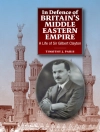This book is the first major attempt to examine the cultural manifestations of the demise of imperialism as a social and political ideology in post-war Britain. Far from being a matter of indifference or resigned acceptance as is often suggested, the fall of the British Empire came as a profound shock to the British national imagination, and resonated widely in British popular culture. The sheer range of subjects discussed, from the satire boom of the 1960s to the worlds of sport and the arts, demonstrates how profoundly decolonisation was absorbed into the popular consciousness. Offers an extremely novel and provocative interpretation of post-war British cultural history, and opens up a whole new field of enquiry in the history of decolonisation.
สารบัญ
Acknowledgements
General editor’s introduction
Introduction
1. The persistence of empire in metropolitan culture – John M. Mackenzie
2. Empire loyalists and ‘Commonwealth men’: The round table and the end of empire – Alex May
3. Coronation Everest: empire and commonwealth in the ‘second Elizabethan age’ – Peter H. Hansen
4. Look back at empire: British theatre and imperial decline – Dan Rebellato
5. ‘No nation could be broker’: The satire boom and the demise of Britain’s world role – Stuart Ward
6. The imperial game in crisis: English cricket and decolonisation – Mike Cronin and Richard Holt
7. Imperial heroes for a post-imperial age: Films and the end of empire – Jeffrey Richards
8. Imperial legacies, new frontiers: Children’s popular literature and the demise of empire – Cathryn Castle
9. Wandering in the wake of empire: British travel and tourism in the post-imperial world – Hsu-Ming Teo
10. Communities of Britishness: Migration in the last gasp of empire – Kathleen Paul
11. South Asians in post-imperial Britain: Decolonisation and the imperial legacy – Shompa Lahiri
12. India, Inc.?: Nostalgia, memory and the empire of things – Antoinette Burton
Notes on contributors
เกี่ยวกับผู้แต่ง
Stuart Ward is Lecturer in History at the Menzies Centre for Australian Studies, King’s College London. He also holds a lectureship at the University of Southern Denmark












